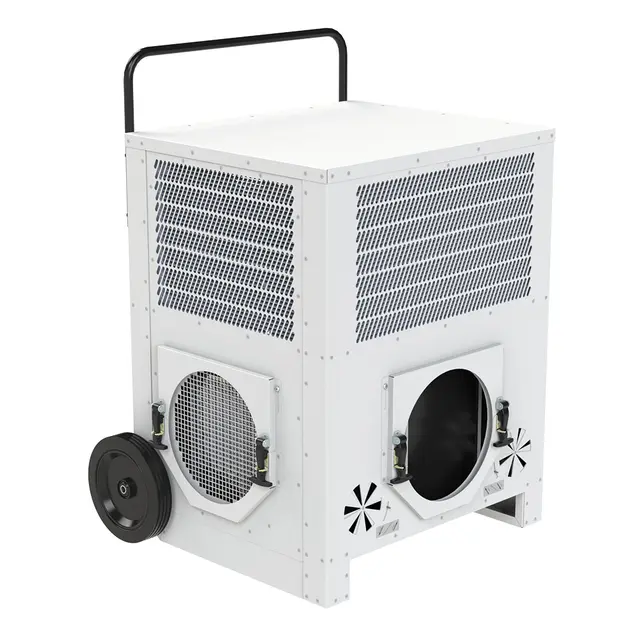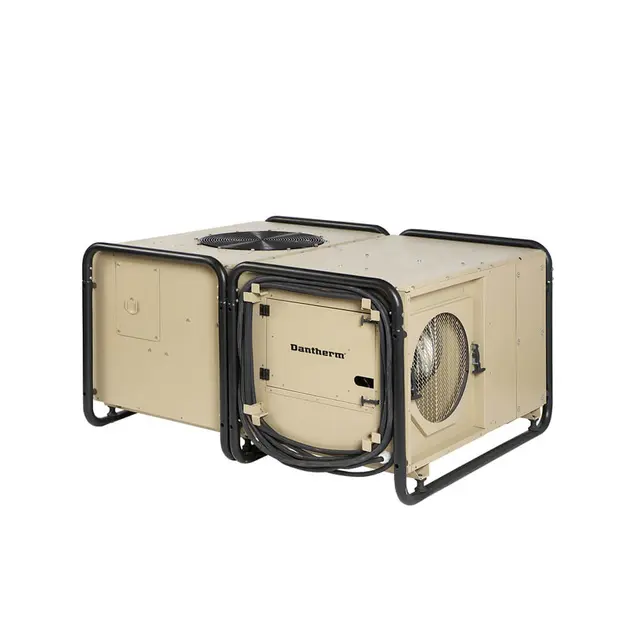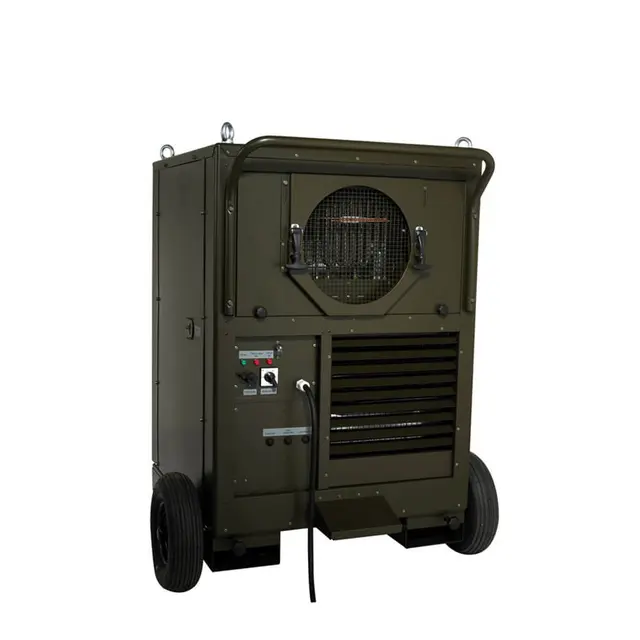Tent coolers: The need for consistent cooling in camps and field hospitals
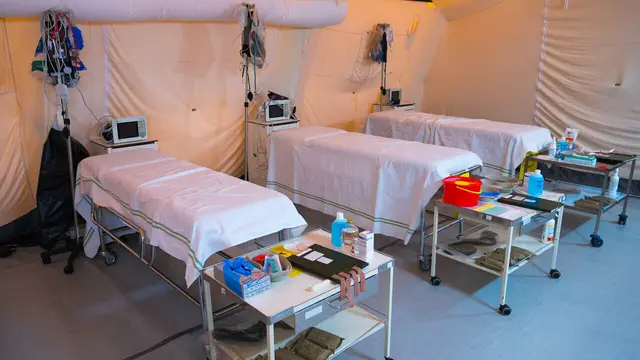
From the deserts of the Middle East to the humid jungles of Southeast Asia – reliable tent cooling is crucial to protect personnel, patients and refugees from high temperatures. Here, we explain why specialist tent coolers are a vital investment for any camp or field hospital.
During disasters, field hospital tents and humanitarian camps must be ready to respond, no matter the climate or location. Staying cool is one of the biggest challenges, especially in the hottest months of the year.
Without effective tent cooling solutions, temporary structures can struggle to beat the heat and safeguard staff, patients, and refugees at their most vulnerable.
Below, we explain the importance of consistent cooling in emergency settings and how the right tent coolers manage high temperatures in any environment.
The urgency of temperature control in refugee camps, field hospitals and more
In refugee camps, disaster relief tents and field hospitals, high temperatures cause more than uncomfortable living conditions. Hot climates can quickly transform discomfort into danger.
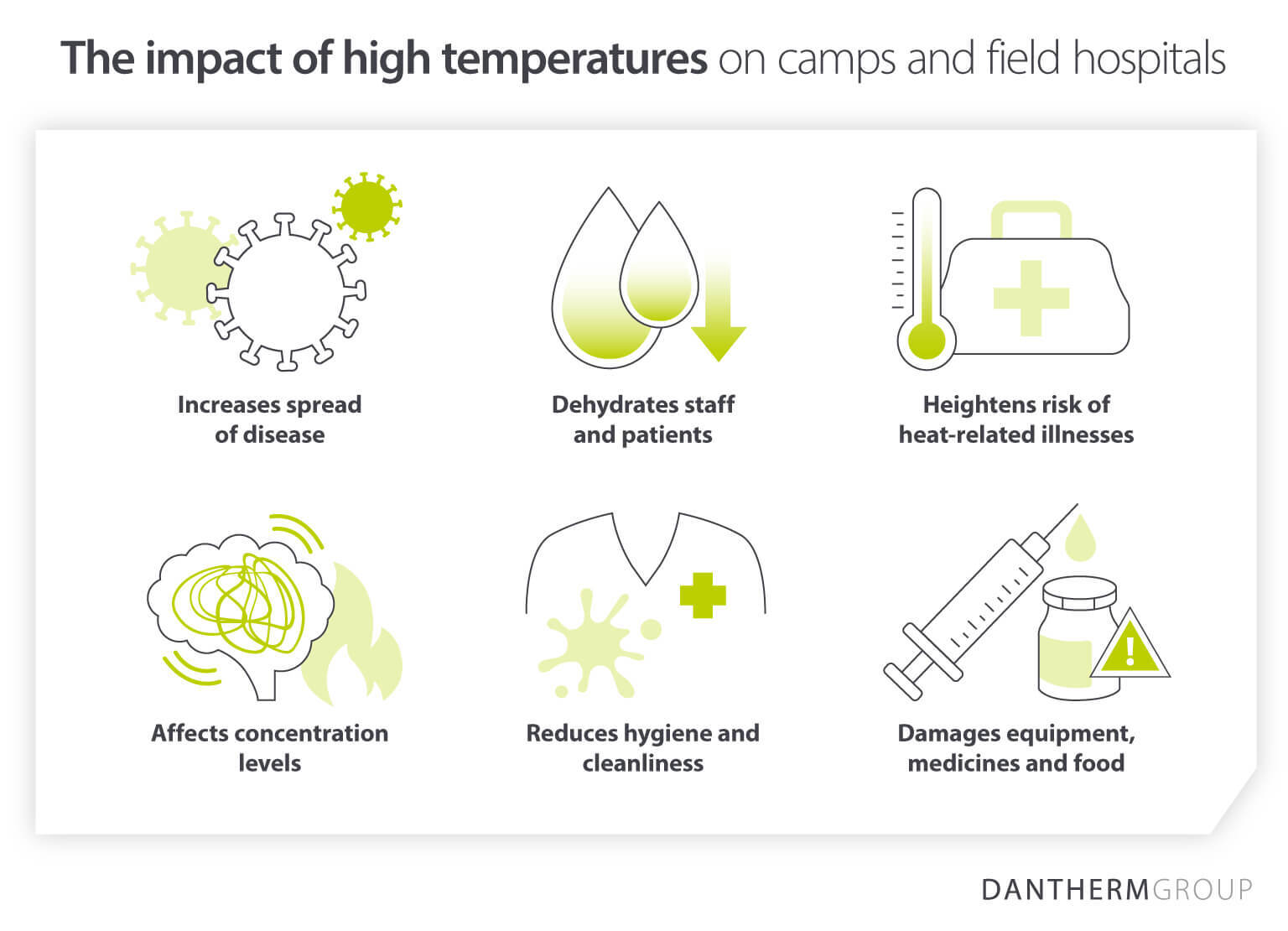
Increased spread of disease
High temperatures and humidity levels accelerate the growth of bacteria and viruses, increasing the risk of infections.
Furthermore, recent research has demonstrated how hotter climates accelerate the transmission of infectious diseases – incredibly dangerous in crowded camps and medical tents.
Capable air cooling systems regulate temperature and airflow, reducing pathogen spread.
Dehydration in patients and staff
Excessive heat can cause significant fluid loss for occupants throughout your camps, leading to dizziness, confusion and organ strain. Cooling solutions help prevent dehydration, supporting patient recovery and staff wellbeing.
Greater risk of heat-related illness and fatigue
Extreme temperatures can cause exhaustion, heatstroke and decreased performance in your medical staff. Air coolers help maintain safe body temperatures, reducing fatigue and the risk of heat-related illnesses.
Reduced concentration
Heat impairs cognitive function, increasing the chances of errors in medical care. A cooler environment helps staff stay focused, ensuring accurate treatments and increasing patient safety.
Decreased hygiene and cleanliness
Sweat, dust and humidity make it difficult to maintain hygiene, leading to damp, bacteria-laden clothing and bedding. Cooling systems help maintain a cleaner, drier atmosphere, preserving hygiene standards.
Damaged equipment, food and medical supplies
Many medications lose their potency when exposed to high temperatures, while perishable food supplies spoil faster. Cooling units maintain the required temperature for critical supplies, ensuring their efficacy and safety.
Tent coolers: The practical, dependable approach to camp and field hospital cooling
High ambient temperatures pose risks to occupants, staff, and supplies, making effective cooling essential for their protection.
However, the mobile, temporary nature of humanitarian camps and field hospitals means that stationary air-conditioning systems or passive cooling solutions are usually unsuitable.
Instead, specialised, portable tent cooling units are the key to keeping temperatures under control in any temporary structure.
What is a tent cooler and how does it work?
A tent cooler is a specialised portable air cooler designed for the harsh climates where field hospitals and refugee camps operate.
The function varies from unit to unit, so let’s use the Dantherm AC-M11 as an example. The tent cooler contains two distinct sections – the evaporator section and condenser section.
Installed outside the tent, the evaporator section draws in warm air from inside via a duct and directs it into the cold evaporator. The evaporator uses an environmentally-friendly refrigerant to cool the air, which is flowed back into the tent via another attachable duct.
Meanwhile, the condenser contains two condenser coils and a large axial fan, which sends heat from the tent into the atmosphere.
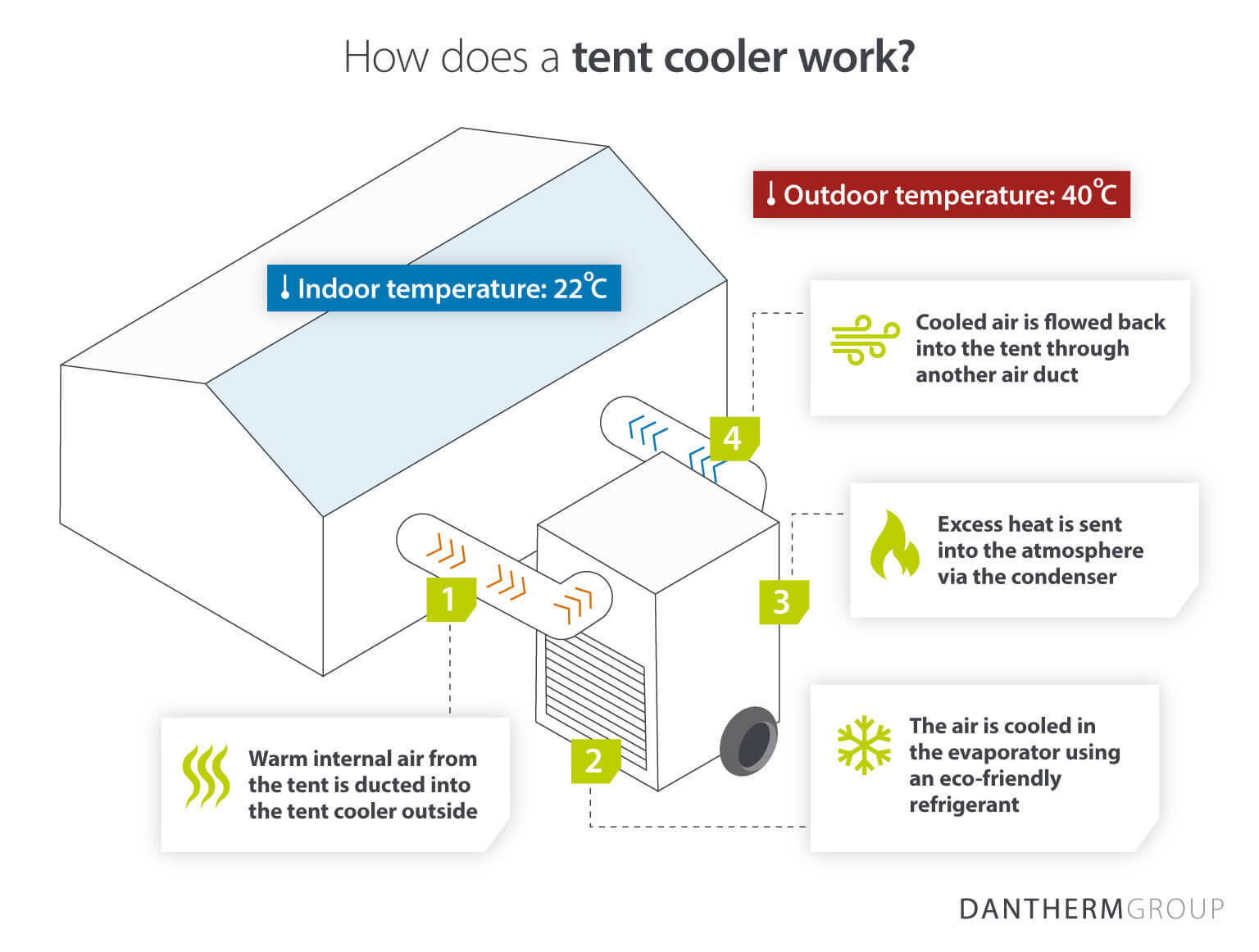
The recirculation increases efficiency, so the system delivers maximum cooling at minimal energy costs.
The right commercial tent cooler is essential for health, comfort and safety in the hottest climates. It protects patients in emergency field hospitals and maintains comfortable conditions in military camps.
6 essential qualities and features to prioritise in tent coolers
So, that begs the question – what qualities should you prioritise to ensure your tent cooler performs at the hottest times of year?
1. Ease of transport and portability
The temporary, mobile nature of camps and field hospitals means tent coolers must be simple to transport.
Prioritise tent coolers made from lightweight, durable materials with trolleys and wheels. Frames that allow forklift handling are also key for rapid relocation.
2. Military-grade, NATO-approved equipment
Focus on high-quality tent cooling solutions trusted by military organisations worldwide. If a cooler meets military standards, you can trust it to perform in your emergency camps or field hospitals.
At Dantherm Group, our military camp cooling systems comply with NATO standards, often developed in collaboration with NATO forces. Our container air-conditioning units are also CBRN/COLPRO compliant, ensuring protection against chemical, biological, radiological and nuclear threats.
3. Rugged and robust construction
Whether in the desert or rainforest, your tent cooler must be able to endure extreme heat. Always seek coolers made from durable, temperature-resistant materials with proven reliability.
For example, our high-performance AC-M6 air-conditioning system is housed in galvanized, powder-coated steel. The robust materials ensure it can deliver emergency camp cooling even at 60ºC.
4. Creating healthy air conditions
High temperatures aren't the only threat to camps and field hospitals. Air quality can also suffer from dust, smoke and airborne contaminants.
Choosing a tent cooler with adjustable fresh air intake, like the Dantherm AC-M18, lets you control airflow, reducing it during dust storms or smoke.
Coolers with dual filtration systems or HEPA filters also help ensure germ-free air, protecting your field hospital patients.
5. Versatile heating in cold weather
Temperatures can vary drastically in some environments. In deserts, days can reach 38ºC, but fall to -4ºC by nightfall.
Instead of purchasing separate tent heaters, investing in tent coolers that also provide heat can save you money and resources. The AC-M11, for example, includes built-in heating that activates below 20ºC.
6. Simple installation and maintenance
You must ensure your tent coolers work reliably when temperatures rise – any malfunction can put people at risk.
Ideally, you want an air cooler that works instantly when connected to the mains or a generator, with an intuitive control panel and thermostat.
Furthermore, a modular design simplifies deployment, while durable components and easy maintenance enhance reliability.
7. Energy efficiency and cost-effectiveness
The running costs of a humanitarian camp or field hospital are often substantial, especially energy demands.
Opt for tent coolers with energy-efficient features like recirculation air ducts to reduce operational costs at remote sites.
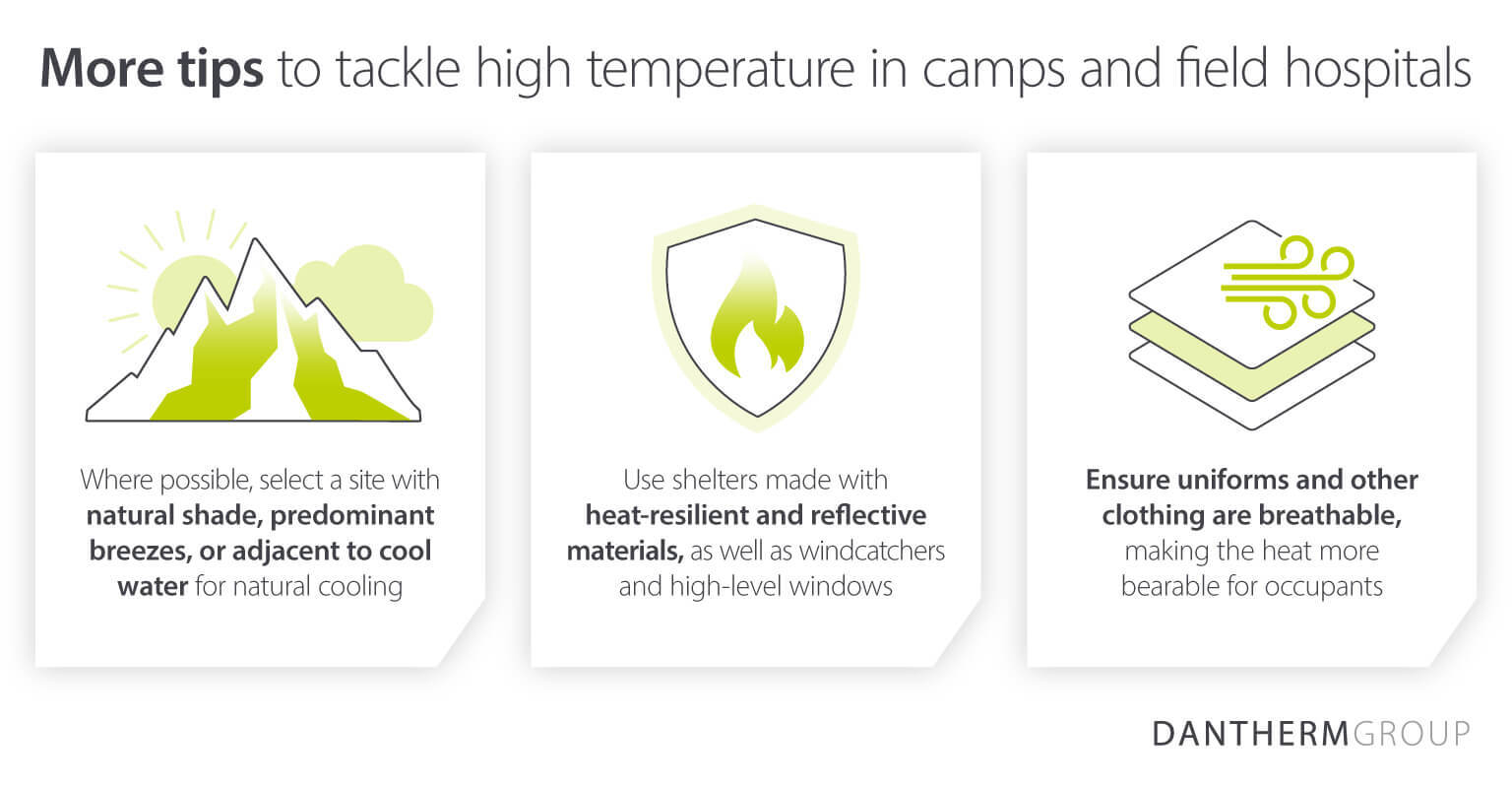
Find the right tent cooler for your requirements at Dantherm Group
We hope you now recognise the vital role tent coolers play in maintaining health and welfare in field hospitals and humanitarian camps, and the features you should emphasise when selecting them.
However, choosing the right tent cooling solution for your sites involves several factors:
The size and capacity of your tents
The number of occupants or stored items per tent
The climate zone around your site
Your mobility and storage requirements
As the European leader in camp and field hospital climate control, our decades of experience engineering and supplying tent coolers worldwide means we can craft the ideal climate control solution for your needs.
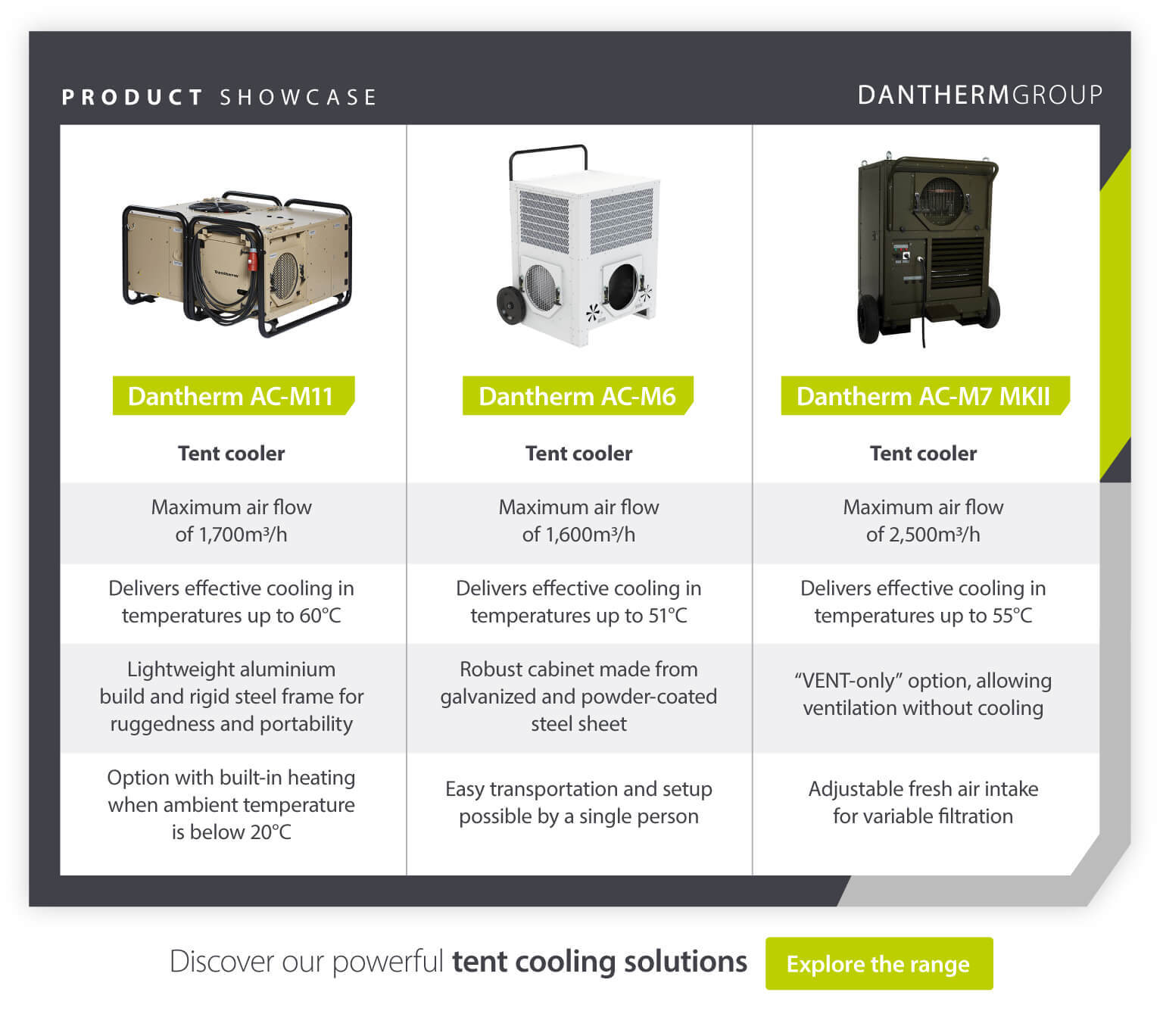
All Dantherm Group tent coolers undergo extensive testing, both out in the field and our state-of-the-art facilities
We work closely with you to design units to your specifications and make regular site visits to ensure they operate effectively
Our global network of suppliers ensures we can deliver your chosen tent coolers as efficiently as possible
From spare parts to technical support – we are responsive to any request
Contact our experts today to discover our full range of mobile cooling units.
Related products
Featured insights
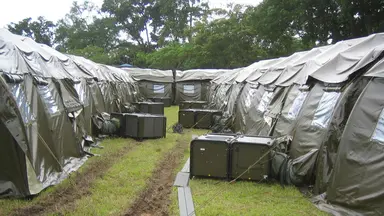
Why our cooling solutions are the top choice for military and humanitarian aid personnel
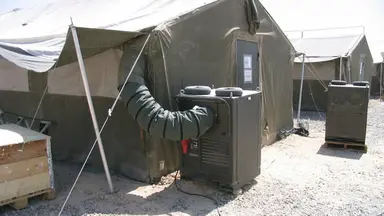
Controlling climates in camps and field hospitals

Climate control that remains resolute in the toughest conditions
Need help with choosing the right solution? Our team of over 100 climate control experts can assist.
You can also reach out or join the discussion on our Social Media. Check out our LinkedIn page.
